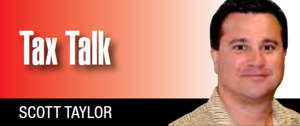Usually, it's easy coming up with topics for this column in March and April. I go to the Canada Revenue Agency Web site, read the "what's new" bulletins, decide what's useful or pertinent to
Truck News readers, and then translate the CRA gobbledegook into English. I call the column "Tax Talk" and away we go.
I'm still calling this column Tax Talk, but it wasn't as easy to write this year. There's less bad news (new taxes) and good news (new deductions) to discuss.
The biggest change on your 2012 tax filing involves contributing to the Canada Pension Plan (CPP). As of Jan. 1, 2012, if you are between 60 and 65 and receive CPP benefits while you keep working, you must continue making CPP contributions on your employment or self-employment income. These contributions go toward a new post-retirement benefit (PRB) created for working people who are between 60 and 70 years old.
If you're an employee, you should have reviewed these changes with your employer already. You selfemployed folks will experience this change when you file your tax return this year. I covered the PRB in the November 2012
Truck News, so I'll refer you to that issue for details.
Instead, I want to concentrate on several personal-tax issues that generate questions every year:
Accrual vs. cash: As a self-employed individual, you report business income by using the accrual method of accounting. You report income in the period you earn it, regardless of when you receive the money. For example, your broker settlement for the period ending Dec. 31 would be December income even though you weren't paid until Jan. 15. Likewise, you deduct expenses in the fiscal period you incur them: ie., your cell phone bill dated Dec. 28 is a December expense even though you paid it in January.
Pension income splitting: Pension income earners can save big by splitting their pension income between spouses/common-law partners. With the right ratio, I've seen $2,000 to $3,000 refunds come out of this calculation that couples had no idea were there. If you're too young to take a pension, what about your parents or in-laws? Make sure they get their returns done by someone who can calculate this split to their advantage.
Medical expenses: These include premiums you or your spouse/common- law partner paid to an insurance company (not a government body) for medical coverage, along with all your receipts for drugs, eyeglasses, dentistry, hearing aids, and other medical services. If you're self-employed, there may be a tax advantage to listing the premiums as a business expense rather than a medical expense on your return. Check the CRA Web site to see what qualifies.
Meals: Meals are deductible at a rate of 50% of $17 per meal up to three meals per day. As of 2011, 80% of expenses for meals by a long-haul truck driver during an "eligible travel period" are deductible. By definition, an eligible travel period covers at least 24 continuous hours during which a driver is away from his or her home municipality or metropolitan area, and is driving a long-haul truck that transports goods beyond a radius of at least 160 kilometres. Seek tax advice from someone who understandshow the rules apply to you and the type of work you do.
Lodging and showers: You can deduct lodging and shower expenses, but keep your receipts to support the amount you deduct. Despite what you may hear, there is no logbook/"away-from-home" calculation for showers.
Cell phones: You can deduct the portion of the airtime expenses and long-distance charges for a cell phone that reasonably relates to earning income as long as your employer requires you to have a cell phone (your employer must sign CRA Form T2200-Declaration of Conditions of Employment). However, you can't deduct amounts you paid to connect or license the cell phone or the cost of fees for Internet service.
GST370: This calculation allows you to reclaim GST/HST paid within your employment expenses. If you travel coast-to-coast in Canada and the US, you need to prorate your meal claim so you claim GST out of the meals from GST provinces, HST from HST provinces, and, of course, zero GST for meals paid for in the US. Your cell phone bills will also contain GST/HST and can be added into this calculation.
Children Fitness/Arts amount: You can claim up to $500 per child for fees paid in 2012 relating to the cost of registration or membership in a physical activity. Also, you can claim up to $500 per child for fees paid in 2012 relating to the cost of registration or membership in an "artistic, cultural, recreational, or developmental" activity. Hey, every little bit helps.
That's the point. The best tax tip I can offer is that while taxes are one of the few sure things in life, you can reduce what you're obligated to pay. It takes sound advice, a little discipline, and good planning throughout the year, but it's worth the effort.
Scott Taylor is vice-president of TFS Group, providing accounting, bookkeeping, tax return preparation, and other business services for owner/operators.
Learn more at www.tfsgroup.com or call 800-461-5970.
